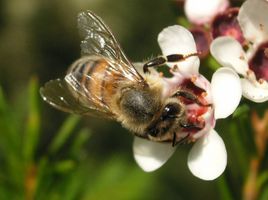Where Have the Honeybees Gone?
Have you learned about the food chain? In the food chain, certain living creatures depend on other ones. What would happen if one disappeared completely? That's a question scientists are asking because of a crisis with honeybees.
Honeybees seem to be disappearing. In more than half the states, beekeepers are facing a catastrophe. The American Beekeeping Federation says one-third of the United States' 2.4 million bee colonies have been affected. What will that do to the food chain in the U.S.? What's happening?
Greg Fallen is a beekeeper, an apiarist. On a warm day one winter, Greg decided to visit his hives on nearby farms. Instead of checking and finding healthy hives, though, he found most of them were completely wiped out. Out of 200 hives, only 50 were left with bees. He talked with other beekeepers that he knew and the same thing was happening to them.
Now you may not think this is a big deal. In fact, you might wonder why anyone would be concerned about something that stings. Honeybees are important because they pollinate crops for farmers. In fact, the U.S. Department of Agriculture states that honeybees pollinate around $200 billion worth of crops each year.
You may also wonder why there are business beekeepers anyway. It seems that nature would just take care of itself. Indeed, if you have a small backyard garden, it does. However, beekeepers raise honeybees for a reason. They take their bees in 18 wheelers all over the place, wherever they are needed for pollinating a large crop. For example, Greg Fallen travels from the cranberry bogs in New Jersey to the apple orchards in Maine. Other beekeepers focus on cucumbers and melons in Virginia, clover in Colorado, almond trees in California, cotton fields in Texas, or citrus groves in Florida. When a beekeeper arrives at the right place, the bees are let go so the crops can be fertilized. Do the honeybees help out any of the foods you like to eat?




